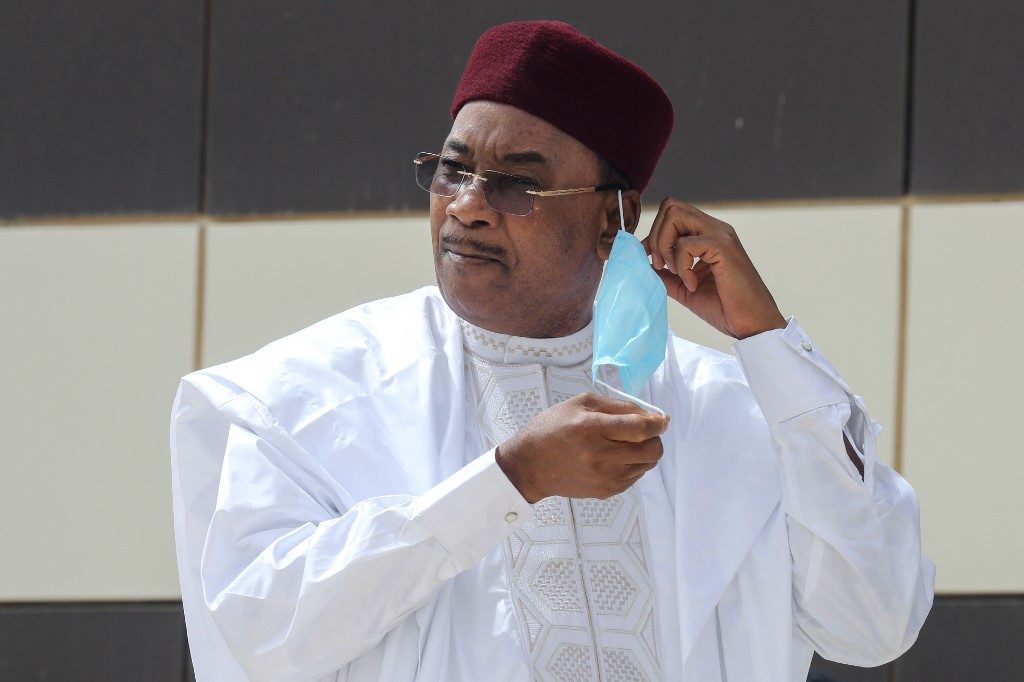SUMMARY
This is AI generated summarization, which may have errors. For context, always refer to the full article.

West African leaders on Monday, July 27, launched a new round of talks on the crisis in Mali to an urgent appeal for bold action and “lasting solutions” for the volatlie state.
Heads of the 15-nation Economic Community of West African States (ECOWAS) convened by video conference 4 days after a failed bid to mediate between Malian President Ibrahim Boubacar Keita Keita and his political opponents.
“The situation in Mali challenges us,” President Mahamadou Issoufou of Niger, the current ECOWAS chair, warned in an opening speech circulated by his aides.
“We must leave this extraordinary summit with lasting solutions and strong decisions capable of guaranteeing the stability of Mali and therefore of the region.”
The bloc’s blueprint for compromise, pitched last week by 5 ECOWAS leaders, failed to win over the June 5 Movement – a loose coalition of opposition groups and religious leaders that is demanding the president’s resignation.
Named after the date when anti-Keita protests began, the movement is tapping into deep anger at failures to right the economy, root out corruption and roll back a bloody jihadist revolt.
Malians are also incensed at the disputed outcome of long-delayed parliamentary elections in March and April that handed victory to Keita’s party.
An anti-Keita protest on July 10 spiraled into clashes which left 11 dead – the worst bout of political unrest Mali has seen in years.
Successive rallies have rattled the 75-year-old president’s grip, stirring fears among neighbors that one of the poorest and most fragile states in West Africa could spiral into chaos.
Compromise plan
First item on Monday’s agenda was a report on the mission to Bamako last Thursday, July 23, led by Issoufou, flanked by counterparts from Ghana, Ivory Coast, Nigeria and Senegal.
They put forward a plan for forming a new unity government and appointing new constitutional court judges who could potentially reexamine disputed election results.
But the June 5 Movement had already rejected any outcome that did not involve Keita’s departure, throwing the success of the scheme into doubt.
Issoufou on Monday called for the “sacred union of all Malians” but stood by the compromise plan.
And he reiterated that forcing out Keita was “contrary” to the democratic rules of ECOWAS.
Keita, who spoke next, attacked the protests, according to ECOWAS sources.
“Those who take to the street want to impose a change of power and carry out a creeping coup d’etat to threaten the secularism of the country,” he was quoted as saying.
The figurehead of the June 5 Movement is Mahmoud Dicko, a conservative Saudi-trained imam who has long been a scourge of Keita’s government.
He firmly rejected any concession last Thursday.
“I would prefer to die as a martyr rather than die as a traitor,” he said.
“The young people who lost their lives (in the protests) did not lose them for nothing.”
On Sunday, July 26, youth members of the June 5 Movement warned they would hike the pressure on Keita after a brief halt in the protests, due to expire after the Muslim festival Eid al-Adha on Friday, July 31.
“After the truce, our actions will resume, harmoniously and without violence,” said a youth leader, Abdourahmane Diallo.
“We have also decided to resume a campaign of civil disobedience on August 3,” said another young campaigner, Mariama Keita.
Keita has come under increasing pressure to end Mali’s eight-year-old jihadist conflict.
The impoverished nation of 20 million has lost thousands of lives, and hundreds of thousands of people have been driven from their homes, despite the presence of French and UN troops.
But much of Mali’s current tension was sparked in April, when the Constitutional Court tossed out 31 results from the parliamentary elections, benefiting Keita’s party and sparking protests.
Tensions then ratcheted up into a crisis on July 10 when an anti-Keita rally organized by the June 5 Movement turned violent. – Rappler.com
Add a comment
How does this make you feel?
There are no comments yet. Add your comment to start the conversation.